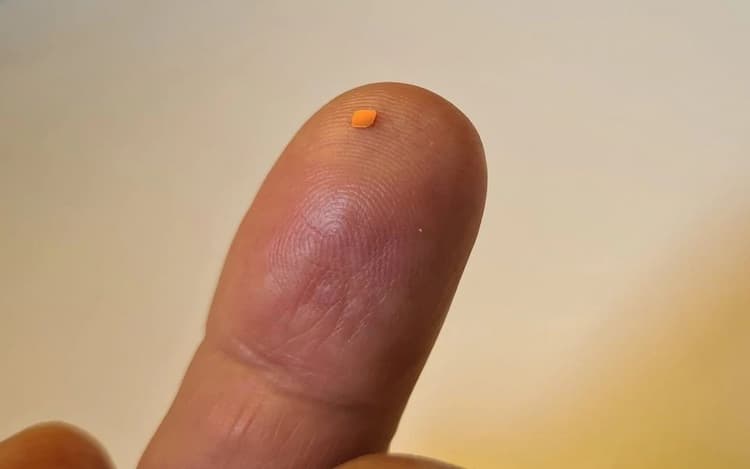Blindness Cured with 'Revolutionary' Bionic Chip
Blindness Cured with 'Revolutionary' Bionic Chip
Blind patients can read and recognise faces again with a “revolutionary” bionic chip, signalling a “new era” for artificial vision.
The implant is an ultra-thin wireless microchip, measuring 2mm by 2mm, which is inserted under the retina and links to a video-camera fitted on a pair of augmented-reality glasses.
Dozens of patients who lost their eyesight through age-related macular degeneration (AMD) were fitted with the device on a trial including Moorfields Hospital in London, with more than 80 per cent seeing major improvements.
About 600,000 people in the UK suffer from AMD, a number that is expected to increase with an ageing population, but there is currently no cure and the condition can be managed only with injections to slow the damage.
The device works with a video camera recording the scene in front of the patient, then AI is used to convert the information to an infrared signal that is beamed to the implant.
The implant stimulates undamaged inner retinal neurons, so they can transmit the signal to the brain, through the optic nerve, where it is interpreted as vision.
Sheila Irvine, one of the first patients on the trial in London, said before the implant she had to live with “two black discs” in front of her eyes, which stopped her reading and driving. “I was an avid bookworm, and I wanted that back. I was nervous, excited, all those things,” she said.
“Initially, I couldn’t see it at all. It was like a big cloud on the page, it was all just white. But I thought to myself, ‘There’s writing on this page, I’m gonna bloody well see it and I’m gonna keep going until I do.’ And then one day I started to see edges and I thought, ‘Here we go, here we go.’
“It’s a new way of looking through your eyes, and it was dead exciting when I began seeing a letter.”
In a healthy retina, photosensitive cells capture light from the environment and transform it into pulses of electricity, which are then sent to nerve cells lining the back of the eye and, eventually, to the brain through the optic nerve.
But, in AMD, light-sensitive cells in the retina are damaged, causing a black spot in the centre of the eye.
Often peripheral vision remains, but through a process known as geographic atrophy (GA), AMD can progress to full sight loss in the eye, as the cells die and the central macula melts away.
In the new trial, 38 patients who were suffering from geographic atrophy were enrolled in trials across Britain, France, Germany, Italy and the Netherlands.
After one year of using the system, the majority of participants showed significant improvement in their ability to read letters on a standard eye chart, with a mean improvement of 25.5 letters and five lines, and one participant improving by as many as 59 letters, or 12 lines.
Mahi Muqit, senior vitreoretinal consultant at Moorfields Eye Hospital and the Institute of Ophthalmology at UCL, added: “These are elderly patients who were no longer able to read, write or recognise faces due to lost vision.
“They couldn’t even see the vision chart before. They’ve gone from being in darkness to being able to start using their vision again, and studies have shown that reading is one of the things patients with progressive vision loss miss most.
“In the history of artificial vision, this represents a new era. Blind patients are actually able to have meaningful central vision restoration, which has never been done before.”
The chip insertion takes just a couple of hours, and is activated after a month, but it takes patients several more months to learn how to see again using the device. A “zoom-in” feature on the glasses allows patients to magnify letters.

The Prima brain computer interface was developed by Science Corporation, the Californian biotech company that specialises in neural engineering.
“This breakthrough underscores our commitment to pioneering technologies that provide hope to patients in need, and which have the ability to transform lives,” said Max Hodak, co-founder and chief executive of Science Corporation.
“We are excited about the potential of Prima to redefine vision restoration for these patients.”
Science Corporation is now working to secure regulatory approval for the device and is hopeful the technology could one day be available on the NHS.
Experts estimate that around one in four people who are legally blind in the UK have GA from AMD.
“This study confirms that, for the first time, we can restore functional central vision in patients blinded by geographic atrophy,” said Dr Frank Holz, lead author of the study, which was published in the New England Journal of Medicine. “The implant represents a paradigm shift in treating late-stage AMD.”
GOP Candidate Stabbed by Anti-ICE Mob
Jan 19, 2026
2 min
Pentagon Readies 1,500 Troops for Minnesota
Jan 19, 2026
1 min
Anti-ICE Mob Storms Minnesota Church
Jan 19, 2026
2 min
EU Calls Emergency Meeting Over Trump Tariffs
Jan 19, 2026
5 min
Spain: 39 Dead in High-Speed Train Crash
Jan 19, 2026
3 min
US Kills Al‑Qaeda Leader Linked to Syria Ambush
Jan 19, 2026
2 min
FBI Captures Top 10 Most Wanted Fugitive
Jan 19, 2026
2 min
Piers Morgan Hospitalized with Broken Hip
Jan 19, 2026
1 min
Judge Bans ICE From Arresting MN Protesters
Jan 17, 2026
1 min
DOJ Probes Walz, Frey for Impeding ICE
Jan 17, 2026
1 min
Charles Wall Named ICE Deputy Director
Jan 17, 2026
2 min
Cohen: I Was Coerced to Frame Trump
Jan 17, 2026
3 min
Trump Unveils New Healthcare Affordability Plan
Jan 17, 2026
3 min
Mossad Chief in US for Iran Talks
Jan 17, 2026
2 min
Machado Gifts Trump Her Nobel Peace Prize
Jan 17, 2026
3 min
DOJ Launches Criminal Probe Into Jerome Powell
Jan 12, 2026
1 min
Report: Trump Orders Greenland Invasion Plans
Jan 12, 2026
2 min
Iran Death Toll Hits 500, 10K Arrested
Jan 12, 2026
3 min
Trump Weighs Potential Military Intervention in Iran
Jan 12, 2026
2 min
Judge Blocks Trump’s Mail-In Voting Restrictions
Jan 12, 2026
2 min

